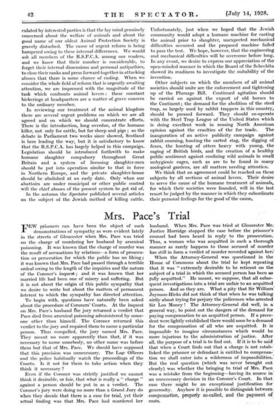Mrs. Pace's Trial
FEW prisoners can have been the object of such demonstrations of sympathy as were evident lately in the streets of Gloucester when Mrs. Pace was tried on the charge of murdering her husband by arsenical poisoning. It was known that the charge of murder was the result of accusations by relations--a form of prosecu- tion 07 persecution for which the public has no liking ; it was known that Mrs. Pace had passed through a terrible ordeal owing to the length of the inquiries and the nature of the Coroner's inquest ; and it was known that her married life had been one of misery and suffering. But it is not about the origin of this public sympathy that we desire to write but about the matters of permanent interest to which the sympathy has directed attention.
To begin with, questions have naturally been asked about the procedure of Coroners' Courts. At the inquest on Mrs. Pace's husband the jury returned a verdict that Pace died from arsenical poisoning administered by some- one other than himself. The Coroner returned this verdict to the jury and required them to name a particular person. Thus compelled, the jury named Mrs. Pace. They meant no more apparently than that, if it was necessary to name somebody, no other name was before them but that of Mrs. Pace. We should have supposed that this precision was unnecessary. The Law Officers and the police habitually watch the proceedings of the Courts. Is it not for them to take action when they think it necessary ?
Even if the Coroner was strictly justified we cannot think it desirable, or fair, that what is really a " charge " against a person should be put in as a verdict. The Coroner's jury were doing no more than a Grand Jury do when they decide that there is a case for trial, yet their actual finding was that Mrs. Pace had murdered her husband. When Mrs. Pace was tried at Gloucester Mr: Justice Horridge stopped the case before the prisoner's counsel had been heard in reply to the prosecution: Thus, a woman who was acquitted in such a thorough manner as rarely happens to those accused of murder has still in form a verdict of murder recorded against her) When the Attorney-General was questioned in the House of Commons about the trial he kept repeating that it was " extremely desirable to be reticent on the subject of a trial in which the accused person has been so fully acquitted." He meant, we suppose, that all subse- quent investigations into a trial are unfair to an acquitted person. And so they are. What a pity that Sir William' Joynson-Hicks did not think of that when he was talking airily about trying for perjury the policemen who arrested Sir Leo Money ! The Attorney-General did well, in a general way, to point out the dangers of the demand for paying compensation to an acquitted person. If a prece- dent were lightly established there would soon be a demand for the compensation of all who are acquitted. It is impossible to imagine circumstances which would be more injurious to the administration of justice. After all, the purpose of a trial is to find out. If it is to be said that when a Court finds out that a charge is not estab- lished the prisoner or defendant is entitled to compensa-' tion we shall enter into a wilderness of impossibilities.' But the real question (which was never brought out clearly) was whether the bringing to trial of Mrs. Pace was a mistake from the beginning—having its source in' an unnecessary decision in the Coroner's Court. In that case there might be an exceptional justification for generosity. Anyhow it is possible to distinguish between; compensation, properly so-called, and the payment of costs.




































 Previous page
Previous page